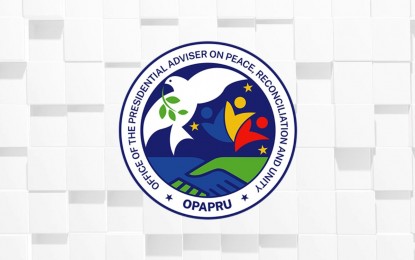From the Philippine News Agency (Aug 4, 2023): Decommissioning shows gov't, Moro Islamic Liberation Front genuine desire for peace (By Priam Nepomuceno)

MANILA – The third phase of the decommissioning process of 1,301 Moro Islamic Liberation Front combatants will conclude on Aug. 10, Office of the Presidential Adviser on Peace, Reconciliation, and Unity (OPAPRU) Secretary Carlito Galvez Jr. said in a statement Friday.
The third phase of the decommissioning which began in September last year resumed at the Old Provincial Capitol, Sultan Kudarat, Maguindanao Del Norte on Thursday.
By the end of the third phase, 26,145 Moro Islamic Liberation Front combatants and 4,625 of their weapons would have been withdrawn.
The decommissioning of all former Moro Islamic Liberation Front combatants highlights the fulfillment of the commitments made by the Government of the Philippines (GPH) and the MILF made under the Comprehensive Agreement on the Bangsamoro (CAB).
The Marcos administration shall not waver in carrying out its commitments under the CAB as it continues to bring “durable peace and development in the Bangsamoro," Special Assistant to the President, Secretary Antonio Ernesto Lagdameo said in his speech during the decommissioning.
“The completion of the third phase signifies the strong partnership of the government and Moro Islamic Liberation Front to pursue a singular vision of transforming the Bangsamoro conflict, reflecting the President's vision to build a Bangsamoro that is self-governing, progressive and effective,” he added.
He said the completion of the decommissioning of former Moro Islamic Liberation Front fighters and their weapons is a testament to the Marcos administration's desire to push forward and sustain the gains of the Bangsamoro peace process.
Aside from Lagdameo and Galvez, others who graced the decommissioning were the Bangsamoro Autonomous Region of Muslim Mindanao (BARMM) Chief Minister Ahod Ebrahim; Independent Decommissioning Body Chairman, Türkish Ambassador Mehmet Suat Akgün; Government Implementing Peace Panel Chair, Defense Undersecretary Cesar Yano; and Moro Islamic Liberation Front Implementing Chair, Mohaqher Iqbal.
Significant part of the normalization track
Ebrahim described the decommissioning process as a “significant component of the Normalization track under the Comprehensive Agreement on the Bangsamoro” as “the Moro Islamic Liberation Front only aspires [for] equal opportunities and access for growth and development for the Bangsamoro people and its homeland.”
“For some, the process of decommissioning might be slow, but may I remind you all that this process takes some time because we are not only transforming the individual lives of the combatants and them productive members of our society but even so importantly, transforming all communities across the BARMM to become peaceful and progressive,” he added.
“There will always be challenges and it requires us to change, adapt to evolving circumstances to create a brighter future for everyone. Let us approach this decommissioning with gratitude for the past, a resolve to complete the normalization [process], and the determination to continually strive for progress no matter what happens,” he added.
Decommissioning is a joint effort
“The joint efforts for the completion of this third phase of decommissioning is a testament to the parties’ sincerity and untiring commitment for lasting peace and sustainable development that is rooted in the aspiration for the fulfillment of real and effective autonomy for the Bangsamoro people,” said Akgün in the same OPAPRU statement.
Yano described the decommissioning process as a “thank you” and “appeal” session to all peace stakeholders.
“Sa aming mga kapatid mula sa Moro Islamic Liberation Front na pawang nagmula sa Lanao del Sur, magkakasama na tayong tumatahak sa landas ng kapayapaan. Humihingi rin kami ng inyong pang-uunawa sa ating mga kinakaharap na hamon (To our brothers in the MILF who came from Lanao Del Sur, we are now together travelling in the path of peace. We asking for your understanding as we face challenges in our journey)," he added in a post in his social media account.
Yano stressed that the key to the successful implementation of the Normalization Program is the synergy between the national government and the Moro Islamic Liberation Front as the Bangsamoro peace process remains “a work in progress.”
Meanwhile, Galvez emphasized that there is a need to “focus on accelerating the implementation of the Normalization Program’s various aspects which include security, socio-economic development, confidence-building and transitional justice, and reconciliation.”
“Crucial to realizing this goal is the joint peace mechanisms such as the GPH-MILF peace Implementing panels and the intergovernmental relations body, which are helping the national and Bangsamoro governments address challenges in the implementation of the Normalization Program, and ensure that all its components are delivered in the best way possible,” the OPAPRU chief said.
https://www.pna.gov.ph/articles/1207124

No comments:
Post a Comment
Note: Only a member of this blog may post a comment.